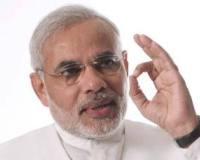British MPs’ invite to Indian leader Modi ‘grotesque’, say scholars
by - 28th August 2013

TWENTY-ONE lecturers from Britain’s top universities including Oxford and Cambridge say they are still awaiting a response to a letter published in the Guardian on 22 August, in which they criticized the invitation by Labour Friends of India, and its Conservative equivalent.
Describing Modi, Chief Minister of Gujerat as ‘a man who is without doubt India's most divisive politician’ they said that the invitation would give the leader ‘credibility’.
‘ . . . Modi, who has never apologised for the massacre of more than 1,000 men, women and children that took place under his watch in 2002, and done little to help its victims, will be joining a select list of special invitees including the pope, the Dalai Lama and Nelson Mandela. This in itself is grotesque.’
Dr Sujit Sivasundaram, Lecturer in Imperial History at Gonville and Gaius College, Cambridge, one of the signatories said: ‘Modi's discriminatory style of development and governance could not be further removed from any political vision espoused by the Labour party, to which his host ostensibly belongs.’
The invitation breaks Britain’s ten-year boycott of Modi for his complicity in - or at least failure to condemn - the massacre of over 2,000 Muslims in the Indian state of Gujarat in 2002, a year after he became the state’s chief minister.
The United States continues to impose the ban it put on Modi in 2005, and the EU only lifted its ban in March this year. Britain lifted its ban in October last year.
More than 7,000 people have signed an e-petition opposing the visit.
Barry Gardiner, the chairman of Labour Friends of India and MP for Brent North, who sent the invitation, justified it on economic grounds in an interview with The Times of India. Britain’s investment in Gujarat was more than in the rest of India, he said.
 Gardiner aggressively defended Modi, the likely prime ministerial candidate for the Hindu nationalist Bharatiya Janata Party (BJP), in the 2014 general election.
Gardiner aggressively defended Modi, the likely prime ministerial candidate for the Hindu nationalist Bharatiya Janata Party (BJP), in the 2014 general election.
‘Just because he is from the BJP does not mean he isn’t secular,’ Gardiner said.
He praised Modi as ‘a secular leader who has the overwhelming support of all communities in Gujarat,’ comparing him to former Indian Prime Minister Atal Bihari Vajpayee, also of the BJP.
But calling Modi ‘secular’ was, for Indians, like calling Richard Dawkins ‘Christian’, writes Lapido correspondent Vishal Arora.
In a blog today Arora, who covered the massacre, says that the invitation ‘shows wilful ignorance of what is widely known about Modi’s ideology and practices.’
The ideology of Modi’s party was constructed around the interests of the majority Hindu community, which supported casteism, and excluded non-Hindus from its belief system, he writes.
In a recent book - Karmayogi - Modi praises manual scavengers – those who according to their caste status clear other people’s sewage from the streets, drains and ‘dry latrines’ literally by hand.
The book was suppressed but not before journalists had got hold of copies.
Writes Arora: ‘While many have struggled for decades to help empower the Dalits, those deemed literally “untouchable” because, according to extreme Hinduism, not even God recognizes them, Modi justified their status.
‘Their work “promoted the happiness of others” he wrote.’
Ironically, Gardiner has invited Modi to speak to the UK parliament on ‘the future of modern India.’
The Sikh Federation (UK) – Britain’s first Sikh political party – are also protesting the invitation, and plan to lobby UK MPs who return to Parliament this week.
They said in a press release: ‘We oppose Modi’s visit not only because of his involvement in the violence in Gujarat in 2002, but because of his recent discrimination of Sikh farmers in Kutch District by trying to have them evicted that demonstrate his policy to make Gujarat and eventually India a Hindu state and no place for minorities.’
- Log in to post comments
